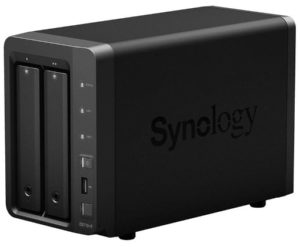Synology’s DS718+ SSD caching is crippled

Synology DS718+
Please note that this story is from 2018, but is still accurate, even if it refers to a fairly old product. Soon after writing this, I had my DS718+ replaced with a DS918+ that has caching that works as it should. That was recently replaced (and made a secondary NAS) with a phenomenal DS1821+.
The Synology DS718+ is one of Synology's flagship models and it's an excellent NAS with high-end features. One of those features is the ability to add SSD caching. After experimenting with rolling my own Synology NAS, I decided to pick one up to replace the DS215j I had outgrown.
Being a 2-bay NAS, my intention was to buy two identically-sized drives (4TB in this case) and put them in a RAID configuration that allows for hardware redundancy. This is how my DS215j is set up and it works great. My "zero-bytes lost" data retention policy is intact and will remain that way.
Since SSDs are a lot faster than mechanical hard drives, having one for caching should improve throughput on the NAS considerably. I planned to add an SSD as well. Unfortunately, the best way to describe SSD caching on the DS718+ is "useless".
SSD caching is there, but good luck getting it
I will be clear about one thing: the ability to use an SSD as a cache does exist and is a legitimate feature of this NAS.
The issue is that order to use it, you need to use up one of the two drive bays. Another option is to purchase a Synology expansion box that costs $500 to expand your $400 NAS. More than doubling the investment doesn't make sense to me, nor does halving the capacity of my NAS and eliminating the ability to have a redundant array.
Nowhere on Synology's site (at least as of today) is there any indication of this severe limitation. There is no asterisk next to the feature on the list, nor anything pointing to its crippled nature.
Asking didn't help
I reached out to Synology chat, tech support, and a regional sales manager. I was told by each that "yeah, that's pretty much it: use a drive bay or do without it". They did try to deflect my concerns by trying to talk about use cases in case the SSD caching wouldn't really offer any speed benefits. I'm sure there's some legitimacy to that point, but it doesn't take away form the fact that it's really a non-feature, and one of the reasons I purchased this model.
As a friend pointed out:
Could you imagine if Intel says a chip supports caching, but you will lose half the cores in your chip, or if it will reduce on-chip memory by half if you use that caching?
I even posted that in one of my messages to Synology tech support and they ignored it. I guess advertising a feature that's not really usable is how they prefer to do things. Again, a simple asterisk would have helped clarify the limits of this feature. That asterisk would have saved everyone a lot of grief.
A possible workaround that doesn't work
The DS718+ does have an eSATA connector, which is how the $500 expansion box attaches. You can attach other drive enclosures, but there are serious limitations, including the inability to use them for SSD caching.
To quote my tech support adviser:
You can use external eSATA drives for storage but not caching but we can't guarantee compatibility with every eSATA enclosure. Only single bay enclosures are supported and you need to provide the enclosure power separately. These do not act like internal storage and thus cannot be used as storage for all packages and features on the NAS. Rather, the storage appears as another shared folder. The same limitations apply for USB drives as well.
So some minor expansion without the $500 box is possible, but there's no way it's going to work for caching.
It works well in another model
The next model up in Synology's roster is the 4-bay DS918+. It has the same processor as the DS718+ but has more system RAM (4GB vs 2GB). Aside from that and the extra bays, there are two M.2 NVMe slots that can be used to hold SSDs, which in turn can be used for caching. The DS918+ costs around $150 more than the DS718+ and it's a good proposition since it actually supports DDS caches in a meaningful way. It can bust the budget for home users, though.
I did ask Synology for a courtesy upgrade and was rather brusquely told that my request was "unreasonable". I also was told that I "needed to work it out with my reseller". Interestingly, most Synology units contain a "do not contact your seller with problems, call Synology" message in the box. I guess that changed.
My reseller in this case is Amazon. After explaining to Amazon that Synology represents the DS718+ as having a feature that is unusable in nearly every reasonable use case, we came to an arrangement that satisfies me. I now feel like I'm getting the features I paid for.
I still like Synology, but am disappointed
Synology is a good company and they make excellent products. They just blew it with the implementation of SSD caching and the way it's represented on the DS718+. That the DS918+ gets it so right shows that they know how to do it. Synology simply made some poor engineering and marketing decisions. In the end, I'm happy with the outcome, but that was Amazon's excellent customer service, not Synology's.
As I explained to Synology:
In the end I am disappointed with Synology's response and general attitude, but will continue to be a customer. I will go into future purchases with open eyes and a different expectation, however.
And I will. I hope when it's time to purchase my next Synology NAS, they have clear information about not only its capabilities but its limitations.
2 Comments
Leave a Comment
You must be logged in to post a comment.

Please Stop blaming Synology!
You have just to read this page of Synology knowledge base :
https://www.synology.com/en-global/knowledgebase/DSM/tutorial/Storage/Which_Synology_NAS_models_support_SSD_cache
Thx
Thanks for the comment and the link. Kindly point out where I am inaccurate in this post and I will happily change it. Synology advertises a feature — even on the link you provide — that is effectively crippled and unusable. Sure, it’s “there” in the sense that it exists, but there’s no practical application for it.
I replaced my DS718+ with a DS918+ that actually has usable SSD caching, and I’m quite happy with that machine.